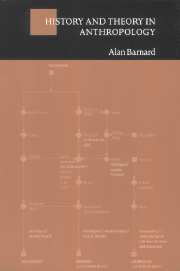Book contents
- Frontmatter
- Contents
- List of figures
- List of tables
- Preface
- 1 Visions of anthropology
- 2 Precursors of the anthropological tradition
- 3 Changing perspectives on evolution
- 4 Diffusionist and culture-area theories
- 5 Functionalism and structural-functionalism
- 6 Action-centred, processual, and Marxist perspectives
- 7 From relativism to cognitive science
- 8 Structuralism, from linguistics to anthropology
- 9 Poststructuralists, feminists, and (other) mavericks
- 10 Interpretive and postmodernist approaches
- 11 Conclusions
- Appendix 1 Dates of birth and death of individuals mentioned in the text
- Appendix 2 Glossary
- References
- Index
Preface
- Frontmatter
- Contents
- List of figures
- List of tables
- Preface
- 1 Visions of anthropology
- 2 Precursors of the anthropological tradition
- 3 Changing perspectives on evolution
- 4 Diffusionist and culture-area theories
- 5 Functionalism and structural-functionalism
- 6 Action-centred, processual, and Marxist perspectives
- 7 From relativism to cognitive science
- 8 Structuralism, from linguistics to anthropology
- 9 Poststructuralists, feminists, and (other) mavericks
- 10 Interpretive and postmodernist approaches
- 11 Conclusions
- Appendix 1 Dates of birth and death of individuals mentioned in the text
- Appendix 2 Glossary
- References
- Index
Summary
This book began life as a set of lecture notes for a course in anthropological theory, but it has evolved into something very different. In struggling through several drafts, I have toyed with arguments for regarding anthropological theory in terms of the history of ideas, the development of national traditions and schools of thought, and the impact of individuals and the new perspectives they have introduced to the discipline. I have ended up with what I believe is a unique but eclectic approach, and the one which makes best sense of anthropological theory in all its variety.
My goal is to present the development of anthropological ideas against a background of the converging and diverging interests of its practitioners, each with their own assumptions and questions. For example, Boas' consideration of culture as a shared body of knowledge leads to quite different questions from those which engaged Radcliffe-Brown with his interest in society as an interlocking set of relationships. Today's anthropologists pay homage to both, though our questions and assumptions may be different again. The organization of this book has both thematic and chronological elements, and I have tried to emphasize both the continuity and transformation of anthropological ideas, on the one hand, and the impact of great figures of the past and present, on the other. Where relevant I stress disjunction too, as when anthropologists change their questions or reject their old assumptions or, as has often been the case, when they reject the premises of their immediate predecessors.
- Type
- Chapter
- Information
- History and Theory in Anthropology , pp. xi - xiiPublisher: Cambridge University PressPrint publication year: 2000

